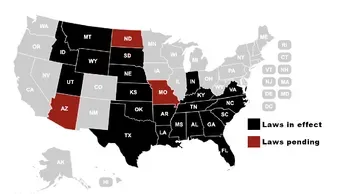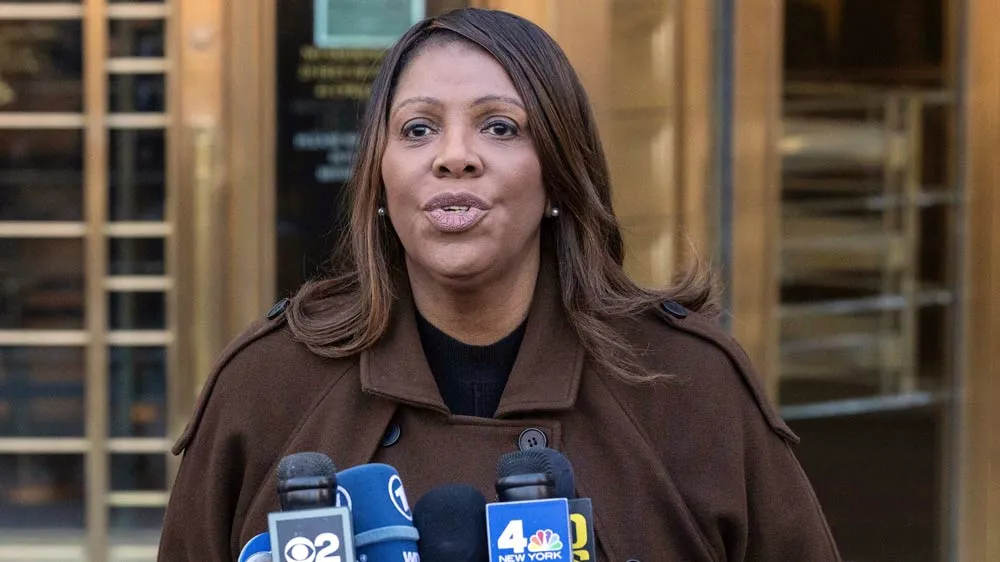
Jul 5
Recent First Amendment SCOTUS Decision Likely to Have Withering Effect on Adult Sites and Beyond
READ TIME: 3 MIN.
The popular NSFW site Str8UpGayPorn may not be suitable for anyone in some 24 states after the Supreme Court on June 27 "upheld a Texas law that required pornography websites to verify that users are 18 or older to ensure that children cannot access their content," reports the Free Speech Center, a nonpartisan, nonprofit public policy center dedicated to building understanding of the five freedoms of the First Amendment through education, information, and engagement.
"Legislators submitting this law and similar legislation in almost half of the states portray this as a commonsense solution to keep porn away from children. First Amendment advocates, however, are concerned that the government is requiring Americans to identify themselves before they can see constitutionally protected material," the policy center says.
Many legal scholars took exception to the decision, noting that it changed the rules regarding First Amendment cases. "The 6-3 decision may appear modest; age-gating pornography to protect children sounds reasonable to many. But its legal rationale carries major implications. It lowers the level of constitutional scrutiny applied to content-based burdens on adult speech and opens the door to vague, privacy-invasive restrictions justified under a banner of child protection," writes the website Public Knowledge.

Source: Str8UpGayPorn
What it means for sites like Str8UpGayPorn is that they must comply with state laws like the Texas one that require standards that include a state-approved age verification system that requires readers in those states to upload a government-issued ID whenever they attempt to access the URL. But Str8UpGayPorn writes they "can't see how this would be feasible for anyone." The company is consulting with a lawyer, and, though not confirmed, writes they might "have to block access for readers living in Florida, South Carolina, Tennessee, Alabama, Arkansas, Kentucky, Louisiana, Mississippi, Oklahoma, Texas, Idaho, Indiana, Montana, Nebraska, Utah, Virginia, North Carolina, Kansas, Georgia, South Dakota, and Wyoming.
"A block may also have to be put in place for North Dakota, Missouri, and Arizona when laws in those states take effect later this summer."
But the implications of this decision go far beyond adult-oriented content, as Alison Boden, the Executive Director of the Free Speech Coalition points out. "This shocking decision goes far beyond adult content or adult websites. The Court has ignored the traditional protections of the First Amendment online and given states free reign to censor controversial content and ideas, so long as the goal is to protect children...
"The implications are profound. In other states, legislators, school boards, and attorneys general have already applied the same 'harmful to minors' standard to restrict sex education materials, drag shows, Pride displays, and classic literature like 'The Handmaid's Tale' and 'Beloved.'
Moreover, the restrictions are rigorous. "In Tennessee, internet users are required to verify their identity every sixty minutes. In South Dakota, any site with any amount of material 'harmful to minors,' including social media, must age verify all visitors. Both laws carry criminal consequences," adds Boden.
On July 1, three more states (Georgia, South Dakota and Wyoming) joined the 18 that already have such laws in effect, with three more (Arizona, North Dakota and Missouri) with pending legislation).
The Free Speech Coalition adds that the South Dakota law moves well beyond just adult sites. In that state, "the operator of any platform with any amount of material 'harmful to minors' is liable under the law and can be prosecuted criminally. This would likely implicate not only adult sites but social media platforms such as X, Reddit, and Discord, retailers of sexual wellness products, including Amazon and Walmart, and platforms with audiobooks and ebooks.
"Even more concerning, Republican-led states like South Dakota have applied the same 'harmful to minors' standard in the age verification law to sexual health resources, young adult novels, Pride displays, and classic literature like 'The Handmaid's Tale' and 'Beloved.' As of July 1, websites with such material may be targeted by the law."
The Free Speech Coalition concludes that they "fear and expect that censorship of both adult and non-adult material and websites will increase dramatically. While we all work to understand the scope of the Supreme Court's ruling, we recommend that all internet sites with resources, products, books, or other material that could potentially be viewed as 'harmful to minors' consult legal counsel to understand the potential risks."







